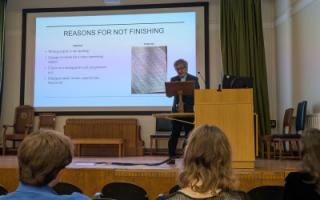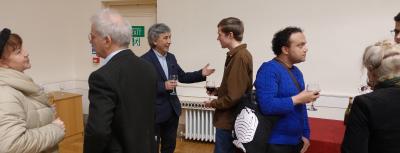We have all heard of writer’s block, blank page syndrome…
But what happens when, at the other end of the writing process, an author finds it impossible to complete a work? How are they to judge when it is time to lay down their pen? What untapped potential might be lurking among the remnants of an abandoned literary project?
These are just a few of the many intriguing questions which Hamid Ismailov set out to explore in this term’s Ilchester Lecture, inviting us to step inside ‘the kitchen of writership’ with him as he reflected on the composition histories of his own unfinished works.
Born into an Uzbek family in Tokmok, Kyrgyzstan, Ismailov was forced to flee Uzbekistan in 1992 under persecution from the Karimov regime. He settled in the UK, where he worked at the BBC for 25 years, including as head of its Central Asian Service. He now lives in Prague and is the Regional Director for Central Asia at Radio Free Europe/Radio Liberty. His prolific literary output includes novels, poetry and translations. Many of his works are set in Central Asia, and frequently draw on folk and Sufi influences, while grappling with issues of linguistic and ethnic diversity and cultural and historical estrangement. His works remain banned in Uzbekistan.

Ismailov began by introducing us to a selection of his unfinished literary endeavours, mostly from early on in his career. Wishing to honour the life of his mother – who passed away when he was twelve – in a diary-like novella, Mother, he hit an impasse when it came to writing about her death. A work entitled Father, Son and Holy Spirit exploring his relationship with his father – who divorced his mother when he was three – fizzled out after half a year. Other such abandoned projects include a satirical novel which followed a photographer named Voytovich on a journey of discovery to Antarctica, and an early version of what is now one of Ismailov’s most famous novels, The Railway. Whereas the published novel was composed in Russian and revolves around the diverse population of a fictional railway town in Uzbekistan, this initial version, entitled Arosad, was written in Uzbek and took the form of a detective novel with an ominous manuscript by Yasawi, an early twelfth-century Sufi poet, at its core.
What was it about these works that meant their author could never complete them? At the time, Ismailov revealed, he could not always grasp the reason for their failure. But with hindsight, he has noticed patterns linking their fate. ‘It was too painful to kill my mother in writing’, he admitted poignantly. After Mother stalled, subsequent works would often open with a death – his mother’s death projected onto another character, as Ismailov sees it. These fragments functioned as experiments in overcoming a subliminal psychological block, their unfinished state symptomatic of a trauma as yet unresolved. Early on in his lecture, Ismailov remarked that a writer is ‘at once guinea pig and researcher’ – to which one might add: at once patient and therapist.
Beyond unprocessed trauma, though, Ismailov proposed a variety of reasons why he has never made it to the end of certain works. These range from discouragement from a peer to the realisation that his idea has already been taken by someone else, from feeling that the ‘writing engine is not igniting’ to switching over to a more interesting subject: Ismailov detailed how, at points during his career, he has had as many as four projects on the go at once. At times, he has had the feeling that he is writing the text in the wrong genre, while at others, disappointment in his own capacities has stopped him finishing a work. To illustrate this, he read us a passage from the draft of his unfinished novel about the photographer, Voytovich, followed by his brutally honest self-critique, penned just below the text in his notebook.
In the second half of his lecture, Ismailov moved on to discuss how literary fragments – beyond just being the scattered remains of abandoned projects – might serve as valuable creative stimuli for a writer. Drawing on examples from across his career, he explained how he has integrated his unfinished fragments into subsequent works, sometimes feeling the need to rework them, at others not. In the case of The Underground, Ismailov reshaped an initial attempt to portray 1980s Moscow through the eyes of his own daughter into a novel whose mixed-race, orphaned protagonist, Mbobo, is a reimagining of Pushkin for the late Soviet period. Sometimes, Ismailov’s struggle to finish a work has given him the creative impulse to broach the subject from a radically different angle: unable to get anywhere with Father, Son and Holy Spirit, his next project developed into a cycle entitled Mother, Daughter and Sinful Soul. Moreover, he has translated fragments originally composed in Uzbek to include them in his Russian-language works, and vice versa. Ismailov even told us that he is currently working on a novel which will itself tell the story of his unfinished fragments.
Ismailov ended his lecture by reflecting on the inherent value of the unfinished in literature, and encouraged us to question our assumptions about what completion looks like. Do we count the Epic of Gilgamesh as unfinished? How about Kafka’s The Castle? Contrasting the Aristotelian framework of self-contained plot with various postmodern perspectives which have emphasised the importance of the partial and the raw over the whole and the cooked in literature, Ismailov stressed the importance he places on breaking with established rules of fiction in order to write new ones. His relationship to the canon and to traditional conceptions of literary completion is a source of a distinctly creative tension.
Highly informative and stimulating, Ismailov’s lecture was also sprinkled with many amusing and touching anecdotes, among them the tale of his returning home one day to find his daughter sitting at his desk, scribbling in his notebook. Was she busy defacing his latest manuscript, as he angrily suspected? No, it turned out – she had scrawled ‘I love you, Dad’ in big letters under the last line he had written. That would be the end of that work, then…
Ismailov’s lecture provided plentiful food for thought, as much for those of us who were discovering his writing for the first time as for those who were already familiar with it. I have certainly been inspired to consider the many lives a literary work may have lived before assuming the form in which we know it today, and I look forward to reading more of Ismailov’s work – finished and unfinished – in the future. As students and scholars of literature, it is always fascinating to hear from living practitioners – and it is to be hoped that we will see Hamid Ismailov in Oxford again before long.

With many thanks to Hamid Ismailov, and to Dr Tamar Koplatadze for organising the lecture.